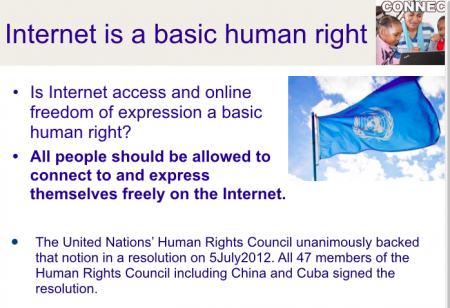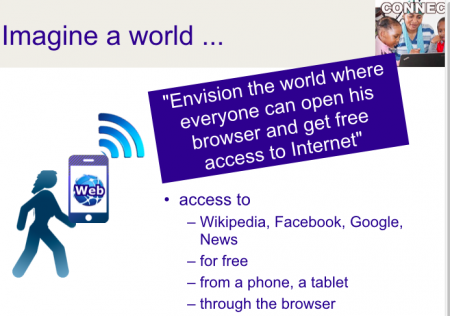Difference between revisions of "Basic Internet access"
Josef.Noll (Talk | contribs) |
Josef.Noll (Talk | contribs) |
||
| (8 intermediate revisions by the same user not shown) | |||
| Line 4: | Line 4: | ||
|Title=Free access to information on the Internet | |Title=Free access to information on the Internet | ||
|Project leader=Josef Noll | |Project leader=Josef Noll | ||
| − | | | + | |Project Participant=Arild Hemstad, Jan Standal, Håkon Wium Lie, Vidar Sannerhaugen, Per Wetterdal |
|StartDate=2013/11/15 | |StartDate=2013/11/15 | ||
| − | |Due_date=2014/ | + | |Due_date=2014/06/30 |
|Partner=UNIK, | |Partner=UNIK, | ||
| − | |Objective=The objective of this project is to provide free information access to everyone. The Internet came to Kjeller and to Europe back in 1973, and 40 years after we | + | |Objective=The objective of this project is to provide free information access to everyone. The Internet came to Kjeller and to Europe back in 1973, and 40 years after we have piloted the free access to basic information. |
|Research_Domain=5G Networks, Internet - IoPTS | |Research_Domain=5G Networks, Internet - IoPTS | ||
|Keywords=Internet.org, Future Internet, free access, Emerging Economies, Innovation4all | |Keywords=Internet.org, Future Internet, free access, Emerging Economies, Innovation4all | ||
}} | }} | ||
| + | <big> Free Basic Internet </big> | ||
| + | is established at UNIK. The technological implementation was straight forward, splitting the access to "basic information" as text and pictures from access to bandwidth consuming services such as streaming and video services. | ||
| + | |||
In 1973 the Internet came to Kjeller, and that was the first installation of the Internet (or [[Arpanet]] how it was called then) to Europe. | In 1973 the Internet came to Kjeller, and that was the first installation of the Internet (or [[Arpanet]] how it was called then) to Europe. | ||
| Line 37: | Line 40: | ||
== Pilot implementation == | == Pilot implementation == | ||
| − | We | + | We have a pilot installation at UNIK at Kjeller, continuing the success of Internet. |
Our aim is to adapt our authentication server (AAA server) such that it allows access from limited browsers such as Opera Mini. Opera Mini provides access to Web information, but does not support streaming, large file download and other heavy-bandwidth services. According to Opera's Mobile Web Atlas 2012<ref> Opera Web Atlas 2012, http://www.operasoftware.com/archive/smw/2012/06/index.html</ref>, a typical user has 4.3 MByte/month, while a nerd might use 17 MByte/month. These numbers indicate that the usage of a restricted Browser like Opera Mini does not harm normal Wifi networks. | Our aim is to adapt our authentication server (AAA server) such that it allows access from limited browsers such as Opera Mini. Opera Mini provides access to Web information, but does not support streaming, large file download and other heavy-bandwidth services. According to Opera's Mobile Web Atlas 2012<ref> Opera Web Atlas 2012, http://www.operasoftware.com/archive/smw/2012/06/index.html</ref>, a typical user has 4.3 MByte/month, while a nerd might use 17 MByte/month. These numbers indicate that the usage of a restricted Browser like Opera Mini does not harm normal Wifi networks. | ||
| − | |||
| − | |||
= Links, downloads and further reading= | = Links, downloads and further reading= | ||
| − | Listen to our vision at [[Our_Dream_Internet_for_everyone]]. Or read more about our vision at [[Basic Internet]].Foundation and | + | Listen to our vision at [[Our_Dream_Internet_for_everyone]]. Or read more about our vision at [[Basic Internet]].Foundation and [http://internet.org Internet.org]. |
* Download our [[Media:201311Free_Information_access_Keynote_Mobility2013_Noll.pdf|Keynote ''Providing Internet Access to Emerging Economies - The Business of Free Access'' (.pdf)]] or as [[Media:201311Free_Information_access_Keynote_Mobility2013_Noll.ppt|(.ppt)]] from the [http://www.iaria.org/conferences2013/MOBILITY13.html The Third International Conference on Mobile Services, Resources, and Users, MOBILITY 2013, November 17 - 22, 2013 - Lisbon, Portugal] | * Download our [[Media:201311Free_Information_access_Keynote_Mobility2013_Noll.pdf|Keynote ''Providing Internet Access to Emerging Economies - The Business of Free Access'' (.pdf)]] or as [[Media:201311Free_Information_access_Keynote_Mobility2013_Noll.ppt|(.ppt)]] from the [http://www.iaria.org/conferences2013/MOBILITY13.html The Third International Conference on Mobile Services, Resources, and Users, MOBILITY 2013, November 17 - 22, 2013 - Lisbon, Portugal] | ||
| − | * | + | == Further reading on business partners == |
| − | * | + | * Basic Internet on the CWI wiki: [[BasicInternet:Basic_Internet|Basic Internet]] |
| − | * | + | * Basic Internet on Facebook: https://www.facebook.com/BasicInternet.foundation |
| − | + | * Basic Internet on Google+: https://plus.google.com/u/0/b/112843192525301686752/112843192525301686752 | |
<references /> | <references /> | ||
Latest revision as of 08:26, 11 February 2016
| Wiki for ITS | ||||||
|---|---|---|---|---|---|---|
|
| Project: Basic Internet access |
|---|
| Free access to information on the Internet |
| Web: | http://cwi.unik.no/wiki/Basic_Internet_access |
|---|---|
| Project leader | Josef Noll |
| Project Participants | Arild Hemstad, Jan Standal, Håkon Wium Lie, Vidar Sannerhaugen, Per Wetterdal |
| Start Date | 2013/11/15 |
| End Date | 2014/06/30 |
| Supported by | UNIK |
| Objective | The objective of this project is to provide free information access to everyone. The Internet came to Kjeller and to Europe back in 1973, and 40 years after we have piloted the free access to basic information. |
| Research Domain | 5G Networks, Internet - IoPTS |
| Keywords | Internet.org, Future Internet, free access, Emerging Economies, Innovation4all |
Factpage of Project Basic Internet access
Equipment used in project: Basic Internet access/Equipment
Free Basic Internet
is established at UNIK. The technological implementation was straight forward, splitting the access to "basic information" as text and pictures from access to bandwidth consuming services such as streaming and video services.
In 1973 the Internet came to Kjeller, and that was the first installation of the Internet (or Arpanet how it was called then) to Europe.
In 1993 the development of the mobile web browser started at Kjeller, leading to Opera Software.
In 2013 UNIK, Kjeller Innovasjon og Opera Software join forces to develop the free Basic Internet access to information on Wifi networks.
Internet access is a human right
The Internet has taken over as the source of information, being it general information as in Wikipedia, scientific information as in Google Scholar and Microsoft Academics or heath information through a variety of channels.
However, 2/3 of the world don't have access to Internet, according to Internet.org[1]. Internet.org is a global partnership between technology leaders, non-profits, local communities and experts who are working together to bring the Internet to the two thirds of the world’s population that don't have it.
Free access to information on the Internet
Our goal is to pilot the free access to Internet information such as Wikipedia, Facebook, Google. Our vision is that wherever you will find a WLAN network, there you will also find free, though limited, access to Internet information.
Everyone should be able to open his browser, and get information about the place, travel opportunities, guidelines, education and health information.
We see that free access has a challenge of that someone has to pay for the infrastructure. Thus, our suggestion is that entertainment, download of large files and streaming will be services which have to be paid for.
Our technology approach
A large number of Wifi networks have already an authentication server, providing "guest" access to the Internet. Examples of this are the European Initiative for Educational Roaming Eduroam or Eduroam.no. Most hotels have such an Web-based Wifi access. Thus, by allowing the Wifi access to allow Internet information becoming available, we will provide a solution which can be adapted in the world.
Pilot implementation
We have a pilot installation at UNIK at Kjeller, continuing the success of Internet.
Our aim is to adapt our authentication server (AAA server) such that it allows access from limited browsers such as Opera Mini. Opera Mini provides access to Web information, but does not support streaming, large file download and other heavy-bandwidth services. According to Opera's Mobile Web Atlas 2012[2], a typical user has 4.3 MByte/month, while a nerd might use 17 MByte/month. These numbers indicate that the usage of a restricted Browser like Opera Mini does not harm normal Wifi networks.
Links, downloads and further reading
Listen to our vision at Our_Dream_Internet_for_everyone. Or read more about our vision at Basic Internet.Foundation and Internet.org.
- Download our Keynote Providing Internet Access to Emerging Economies - The Business of Free Access (.pdf) or as (.ppt) from the The Third International Conference on Mobile Services, Resources, and Users, MOBILITY 2013, November 17 - 22, 2013 - Lisbon, Portugal
Further reading on business partners
- Basic Internet on the CWI wiki: Basic Internet
- Basic Internet on Facebook: https://www.facebook.com/BasicInternet.foundation
- Basic Internet on Google+: https://plus.google.com/u/0/b/112843192525301686752/112843192525301686752
- ↑ Internet.org
- ↑ Opera Web Atlas 2012, http://www.operasoftware.com/archive/smw/2012/06/index.html
- internal information FWA:Main_page
Related Meetings
Basic Internet access related Meeting(s):- SANA-BIF Collaboration Introduction (onThis property is a special property in this wiki. 25 June 2020)
- Free Web access: Opportunity for Kjeller (onThis property is a special property in this wiki. 12 November 2013)

